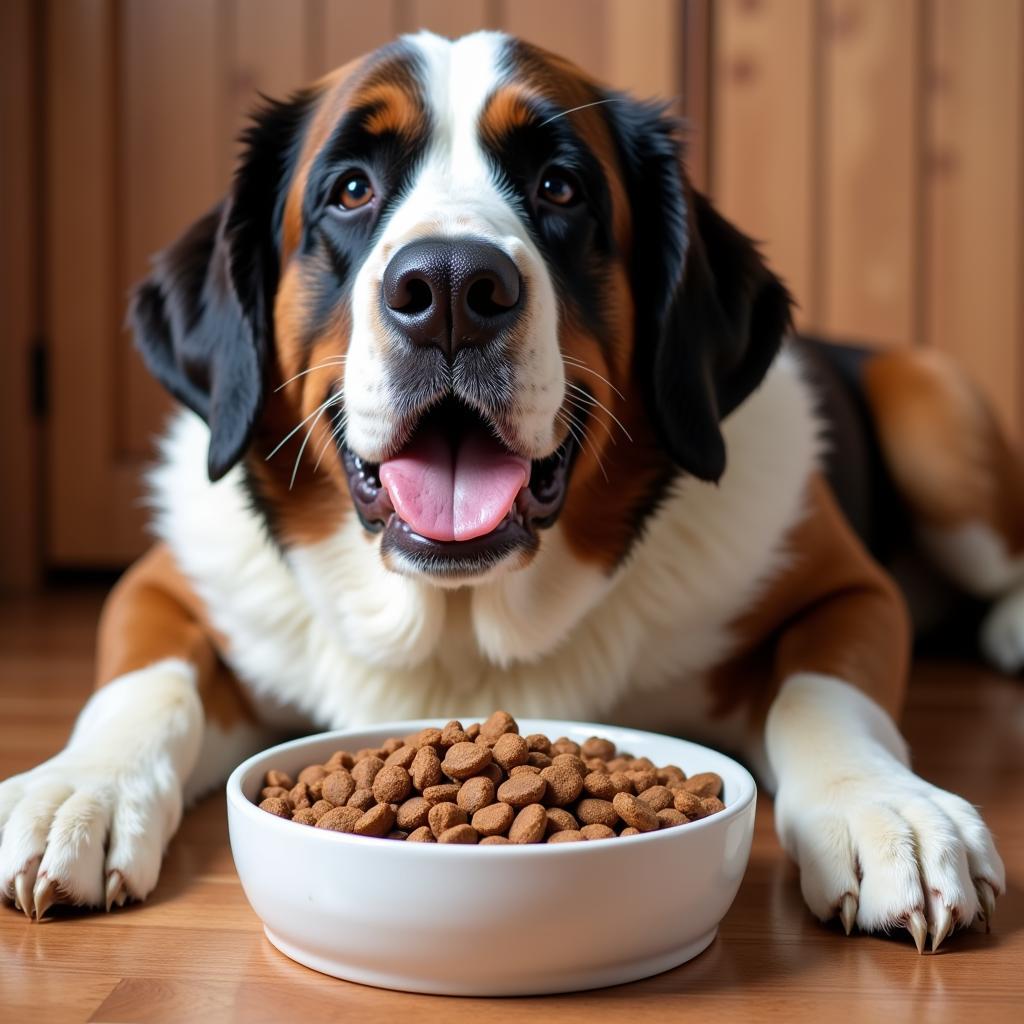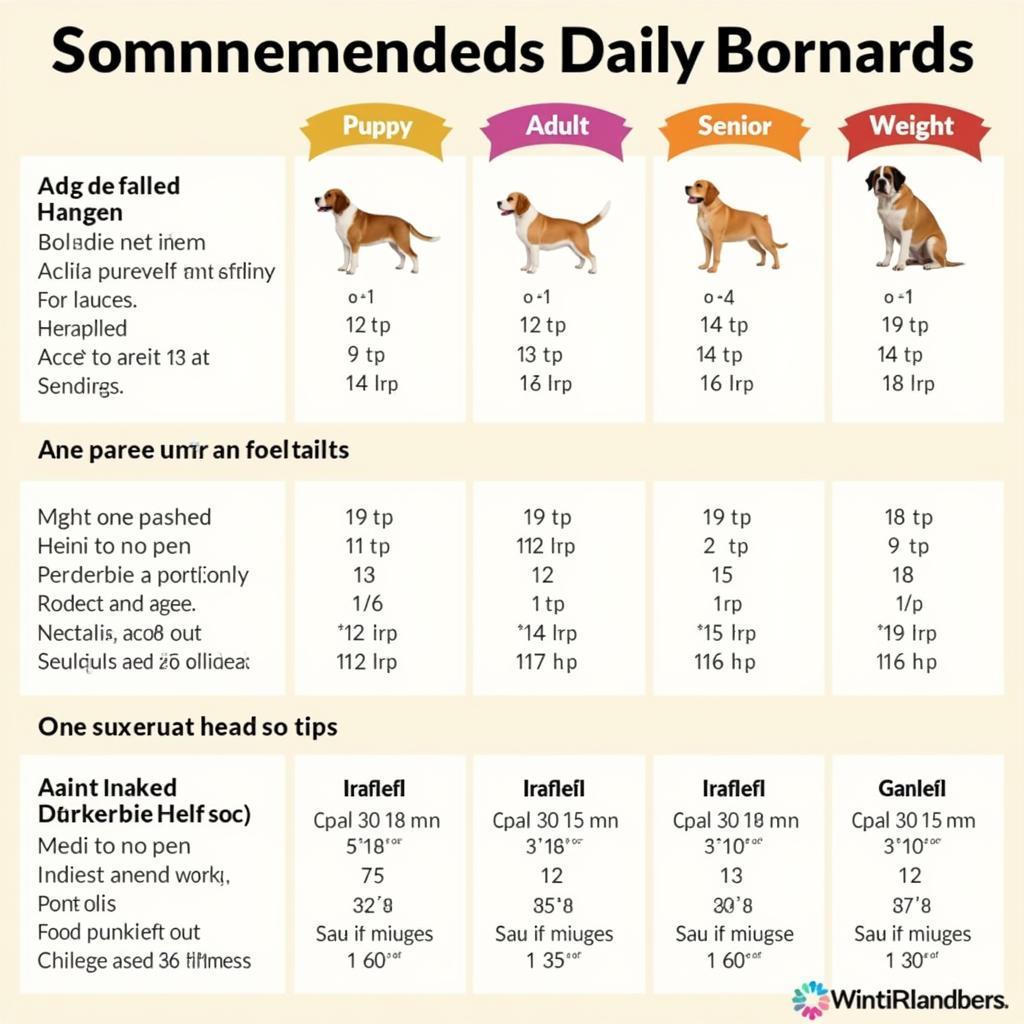Finding the Best Dog Food For Saint Bernards can feel like a daunting task. These gentle giants have specific nutritional needs to support their large frames and active lifestyles. Choosing the right food is crucial for their overall health, from puppyhood to their senior years. This article will guide you through everything you need to know to make the best choice for your furry friend.
Choosing the right food for your Saint Bernard is a big responsibility. Their large size and gentle nature require specific nutrients to ensure they live long, healthy, and happy lives. We’ll delve into the nutritional requirements, common health concerns, and feeding guidelines for these magnificent dogs, helping you understand how to choose the best dog food for Saint Bernards.
Understanding the Nutritional Needs of a Saint Bernard
Saint Bernards, being a giant breed, have unique dietary requirements. They need a balanced diet rich in protein for muscle development and maintenance, healthy fats for energy and coat health, and carbohydrates for sustained energy. Calcium and phosphorus are essential for strong bones and joints, especially important for a large breed prone to hip and elbow dysplasia.
Proper nutrition also supports their immune system and helps maintain a healthy weight, preventing obesity, which can exacerbate joint problems. Look for dog food formulated for large breeds, with controlled calcium levels to prevent skeletal issues during growth.
 Saint Bernard enjoying a healthy meal
Saint Bernard enjoying a healthy meal
Key Ingredients to Look for in Saint Bernard Dog Food
High-quality protein sources like chicken, lamb, beef, or fish should be the primary ingredients. Avoid foods with fillers like corn, wheat, and soy, as these offer little nutritional value and can contribute to allergies. Look for foods with added glucosamine and chondroitin for joint support, especially important for this breed. Omega-3 fatty acids from fish oil or flaxseed are beneficial for skin and coat health.
Antioxidants like vitamins E and C boost the immune system. Remember to check the guaranteed analysis on the dog food label to ensure the appropriate levels of protein, fat, and other essential nutrients.
Feeding Guidelines for Saint Bernards
The amount of food your Saint Bernard needs depends on their age, activity level, and individual metabolism. Puppies require more frequent meals with higher calorie density to support their rapid growth. Adult Saint Bernards typically do well with two meals a day. Avoid free-feeding, as it can lead to overeating and obesity.
Always provide fresh, clean water. Monitor your dog’s weight and adjust their food intake accordingly. Consult your veterinarian for personalized feeding recommendations based on your dog’s specific needs. They can help you determine the best dog food for your Saint Bernard and create a feeding plan that supports their optimal health.
 Feeding chart showing recommended portion sizes based on age and weight
Feeding chart showing recommended portion sizes based on age and weight
Common Health Concerns and Dietary Considerations
Saint Bernards are susceptible to certain health issues, including hip and elbow dysplasia, bloat, and heart conditions. Choosing the best dog food for your Saint Bernard can play a crucial role in mitigating these risks. For example, maintaining a healthy weight through proper diet and exercise can significantly reduce the strain on their joints, minimizing the risk of dysplasia.
Talk to your veterinarian about specialized diets for specific health concerns. They can recommend foods formulated to support joint health, cardiac function, or sensitive stomachs.
What is the ideal protein content for a Saint Bernard’s diet?
A Saint Bernard’s diet should ideally consist of 22-26% protein.
How much should I feed my Saint Bernard puppy?
Consult a vet and the guidelines on your chosen puppy food as this will depend on the breed, age, and activity level of your pup.
What are some signs of food allergies in Saint Bernards?
Some common signs are itchy skin, excessive scratching, ear infections, vomiting, and diarrhea.
Choosing the Right Dog Food: Dry, Wet, or Raw?
Deciding between dry kibble, wet food, and raw diets can be tricky. Each has its pros and cons. gentle giant dog food caters specifically to large breeds. Dry kibble is generally more affordable and convenient, while wet food can be more palatable for picky eaters.
Raw diets require careful preparation and balancing to ensure complete nutrition. Discuss the best option for your Saint Bernard with your veterinarian, taking into account their age, health, and preferences.
Conclusion: A Lifelong Commitment to Nutrition
Providing the best dog food for your Saint Bernard is a vital part of responsible pet ownership. By understanding their specific needs and choosing a high-quality, balanced diet, you can ensure your gentle giant enjoys a long, healthy, and happy life. Remember to consult with your veterinarian for personalized recommendations and regular check-ups to monitor your dog’s health and adjust their diet as needed. With proper nutrition, your Saint Bernard will thrive, bringing joy and companionship for years to come.
FAQ
- What are the best dog food brands for Saint Bernards? Several reputable brands offer large-breed formulas suitable for Saint Bernards. Consult your vet for recommendations tailored to your dog’s specific needs.
- How often should I feed my adult Saint Bernard? Most adult Saint Bernards thrive on two meals a day.
- Can I feed my Saint Bernard raw food? While possible, raw diets require careful planning and monitoring to ensure balanced nutrition. Consult your veterinarian before switching to a raw diet.
- What are the signs of a food allergy in a Saint Bernard? Itchy skin, excessive scratching, gastrointestinal issues, and ear infections can be signs of food allergies.
- How much food should I give my Saint Bernard puppy? Follow the feeding guidelines on the puppy food packaging and consult your vet for specific recommendations.
- How can I prevent bloat in my Saint Bernard? Avoid feeding large meals, especially before or after strenuous exercise. Elevated feeding bowls can also help.
- What are the signs of hip dysplasia in a Saint Bernard? Lameness, difficulty rising, and a reluctance to exercise can be signs of hip dysplasia.
Need further assistance? Contact us at Phone Number: 02437655121, Email: minacones@gmail.com Or visit us at: 3PGH+8R9, ĐT70A, thôn Trung, Bắc Từ Liêm, Hà Nội, Việt Nam. We have a 24/7 customer service team.